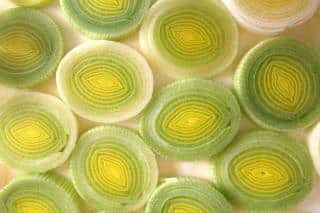

Clearly one of the most popular vegetables we grow, leek or Allium porrum is always there on the market stall for us to find. Its health benefits and therapeutic value have been known for ages, and it is part of the diet of a great many cultures.
It belongs to the same family as garlic and onions.
Native to Middle East, leek quickly became a staple vegetable for the Greeks, the Romans and the Egyptians.
If we are to believe the famous “Satire of the Trades” it was indeed very appreciated by the Egyptians.
The Hebrews appreciated it for its health benefits, especially its refreshing properties. As for the Greeks and Romans, they considered it both as a vegetable and a true remedy.
It is part of of the 10 most eaten vegetables in France, although other countries and notably the Americas don’t value it as highly yet. Its health benefits are undeniable! It is rich in fibers, vitamins and minerals.
 A diuretic, leek is used by persons who suffer from urinary retention. Leek broth or soup are recommended in that case.
A diuretic, leek is used by persons who suffer from urinary retention. Leek broth or soup are recommended in that case.To grow good leek, you must have full sun exposure but not too hot, and cool, rich, deep, well-drained soil.
The base of the stem is sometimes attacked by onion maggot fly larvae, which leads to their rotting.
Leaves can dry up and die due to allium leaf-mining flies which dig tunnels in the leaves. White rot is the cause of leek yellowing and dying off.
Finally, rust can form oranges spots on the lower part of leaves.
Leek can be eaten steamed or boiled. Fried, it is a delicious side dish to fish and crabs. Leek can even be pickled for those bittersweet fans!
29 kcal / 3.5 oz (100 g). Leek loaded with fibers (3,2g for 3.5 oz (100 g)) which explains its prowess in resolving intestinal transit disorders.
It contains potassium, iron and vitamin B9. Know also that it is an excellent diuretic.
Not so common, but just as delicious as cooked leek, young leek eaten raw (in mixed salads) will surprise you!
Try also this leek and ham quiche, or this leek pie variation!
Blandine Merlin